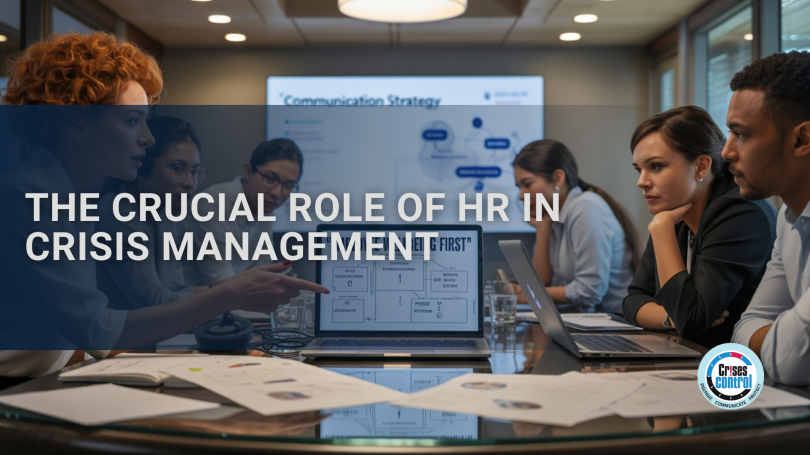In any organisation, crises and emergencies tend to occur every so often. These crises can range from data breaches, weather disturbances, terrorist attacks, pandemics, to lawsuits, just to mention a few. Whatever the case, it’s essential to have a plan in place to manage these issues when they occur, and that’s where crisis management comes in. Crisis management is a crucial aspect of any organisation, and there is a pivotal player – Human Resources (HR). HR’s role in crisis management is quite critical, as they are responsible for ensuring employee safety and well-being while also preserving the business’s culture. In this blog, we’ll discuss HR’s role in crisis management.
The Benefits of Having HR Involved in Crisis Management
Having HR actively engaged in crisis management offers a myriad of benefits that go beyond the traditional HR role. The multifaceted nature of crises, highlights the importance of a strategic approach that considers both the well-being of employees and the organisation’s ability to navigate through adversity. This synergy between HR and crisis management is not merely a matter of convenience; it’s a strategic move that can significantly bolster an organisation’s resilience. Here are some key advantages:
People-Centric Approach
HR brings a unique people-centric perspective to crisis management. They understand the workforce’s needs, concerns, and capabilities, ensuring that responses are considerate of employee well-being.
HR professionals are well-versed in providing emotional support to employees. They can create channels for employees to express their concerns, seek assistance for personal or work-related issues, and access resources for managing stress and anxiety. This emotional support is invaluable during crises when the well-being of employees is paramount.
HR can initiate wellness programmes that promote physical and mental well-being. These may include virtual fitness classes, stress reduction workshops, or initiatives that encourage work-life balance. Such initiatives not only support employees but also reinforce the organisation’s commitment to their welfare.
Effective Communication
HR professionals excel in communication. Their expertise ensures that messages are clear, empathetic, and reach all stakeholders promptly. This is crucial during crises when misinformation can exacerbate the situation.
HR professionals are adept at conveying critical information to employees in a clear and empathetic manner. When a crisis strikes, employees often look to HR for guidance and reassurance. HR can provide essential information on safety protocols, updates on the crisis situation, and instructions on how to access necessary resources, such as medical assistance or counseling services.
Crises can take a toll on employee morale and well-being. HR can play a crucial role in providing emotional support and resources to help employees cope with the stress and uncertainty that crises bring. This includes offering mental health resources, organising wellness programs, and ensuring that employees feel heard and supported during challenging times.
While crises primarily affect internal operations, they can also have a significant impact on an organisation’s reputation in the eyes of the public. HR professionals can collaborate with the crisis management team to ensure that external communication, such as press releases or social media updates, aligns with the organisation’s values and maintains a positive image. They can also offer guidance on handling media inquiries effectively.
Culture Preservation
During turbulent times, an organisation’s culture can be tested. It’s when values are put to the test, and the way an organisation responds to crises can significantly impact its culture.
HR ensures that crisis response strategies align with the organisation’s core values. This alignment is crucial because it sends a powerful message to employees that the company remains committed to its principles even in the face of adversity. For example, if an organisation values employee well-being, HR will advocate for measures to protect and support employees during a crisis.
Trust is the cornerstone of a healthy workplace culture. HR plays a vital role in preserving and rebuilding trust during crises. They can facilitate open and honest communication between leadership and employees, addressing concerns and dispelling rumours. By fostering an environment of trust, HR helps prevent the erosion of the organisational culture.
Incorporating HR into your crisis management strategy can be a game-changer. Their expertise in human dynamics, communication, and talent development can significantly enhance an organisation’s resilience in the face of crises. The benefits extend far beyond the crisis management phase, creating a more prepared and adaptive organisation overall.
Conclusion
The role of Human Resources (HR) in crisis management is nothing short of pivotal. From fostering a culture of preparedness to championing employee well-being, HR’s influence extends across every facet of crisis management. They provide a people-centric approach, ensure effective communication, and play a vital role in preserving an organisation’s culture during turbulent times.
To witness how Crises Control can amplify your HR team’s efforts in crisis management, request a live demo. Take the first step towards a more secure and prepared future, where your organisation’s readiness for crises is strengthened by the expertise of HR and the capabilities of Crisis Control. We can help you navigate the path to a more resilient tomorrow.







